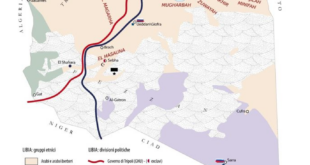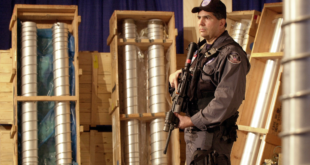 ZEMMOURI, Algeria (Reuters) – A suicide car bomb attack on security forces killed at least six civilians east of Algiers late on Saturday, the second such blast this month, authorities in OPEC member Algeria said on Sunday.
ZEMMOURI, Algeria (Reuters) – A suicide car bomb attack on security forces killed at least six civilians east of Algiers late on Saturday, the second such blast this month, authorities in OPEC member Algeria said on Sunday.
Interior Minister Noureddine Yazid Zerhouni told state radio six civilians were killed and 18 injured in the attack at 10 p.m. (2100 GMT) in the coastal town of Zemmouri el Bahri, 45 km (28 miles) east of the capital.
The official APS news agency earlier put the toll at eight killed and 19 wounded.
Local people said gendarmes opened fire on the bomber when he refused to stop his vehicle, and he shouted “God is Great” seconds before detonating the bomb.
The radio said the bomber’s targets were a coastguard barracks and an adjacent post of the paramilitary gendarmerie. Witnesses said the gendarmerie post was destroyed but the barracks were only slightly damaged.
The radio reported Zerhouni as saying the bomber used between 200 and 300 kg of explosives and that the attack appeared to be retaliation for an army ambush that killed 12 rebels in mountainous Kabylie region overnight on August 7 to 8.
Newspapers have said that ambush was part of the army’s pursuit of rebels who orchestrated a suicide car bombing which wounded 25 people in Tizi Ouzou town east of Algiers on August 3.
That attack was claimed by al Qaeda’s north Africa wing, the al Qaeda Organisation in the Islamic Maghreb. There was no immediate claim of responsibility for Saturday’s attack.
MORE VIOLENCE
Al Qaeda said the Aug 3 blast was a message to “the sons of France and the slaves of America” that it was ready to inflict more violence to defend what it called the Islamic nation.
The group has links with like-minded militants in north Africa and is the most effective armed rebel organisation in the country of 34 million, Africa’s second largest country by area.
The group has claimed several attacks in the past including the twin suicide bombings of U.N. offices and a court building in Algiers in December 2007 which killed 41 people, 17 of them United Nations staff.
Algeria, an important supplier of gas to Europe, is emerging from more than a decade of conflict that began in 1992, when the military-backed government scrapped legislative elections a radical Islamic party was poised to win.
About 150,000 people have died during the ensuing violence.
The bloodshed has subsided in recent years and in 2006 the government freed more than 2,000 former Islamist guerrillas under an amnesty designed to end the conflict.
But a hard core of several hundred rebels fights on as members of al Qaeda’s north Africa wing, which was previously known as the Salafist Group for Preaching and Combat or GSPC.
The group’s leader, Abdelmalek Droukdel, told the New York Times last month that increasing numbers of young men around the region were joining the group because of persistent poverty and anger at what he called the West’s war on Islam.
 Eurasia Press & News
Eurasia Press & News

